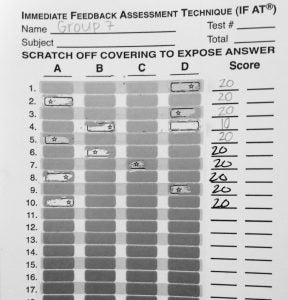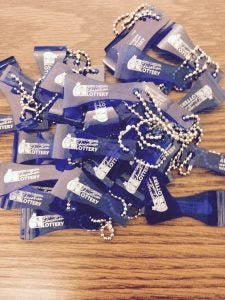September 24, 2015
Accounting Professor Implements Scratch Off Card Method in Classroom
This summer I had the privilege of attending a two day workshop taught by Dr. Dee Fink. The focus of the workshop was learning how to redesign your course to create a more significant learning experience for the student. Since the workshop was held in the summer, I was a little hesitant about attending “school” for two days, but now after having implemented some of the changes and seeing the results, I’m so glad I went!
According to Dr. Fink’s teaching, a significant learning experience is one in which the students are engaged in their own learning, and there is a high level of energy associated with the class. The desired outcome is that the student not only learns the material but that the course improves the student’s life in one or more of the following ways:
- Enhance their social interaction with others – teaching them how to engage with others in a more positive way;
- Become more informed and thoughtful citizens – develop a readiness to participate in civic activities;
- Prepare them for the world of work – helping them to develop knowledge, skills, and attitudes necessary for being effective in their profession.
What I love about this concept is that the student is more involved in their own learning; it’s not the typical classroom scenario where the teacher lectures, and the student takes notes. That bores me and the students get bored, especially when discussing accounting! So after attending the workshop, I decided to try one of the methods used. Meet the Immediate Feedback Assessment Technique (IFAT), informally referred to as the scratch off card.
Here’s how the IFAT or scratch off card works. First, the students take a quiz individually. Then they meet with their group members to discuss the quiz, selecting what they feel is the most appropriate answer. This is where the significant learning begins. The students are discussing the topic and teaching each other about why a certain answer is best. They are engaging with each other developing both their verbal communication skills and interpersonal skills, while at the same time being forced to work with people they don’t know since the groups were selected randomly.
After selecting what they feel is the most appropriate answer, one member of the group scratches off their selected answer, (A, B, C or D), and if the group chose the correct answer, then a star will be revealed under the scratch off slot. That means the group gets the maximum number of points for that question, in this case 20 points. If they didn’t select the best answer, they get to try again. If they select the correct answer the second time, then they will receive half the amount of points, 10; third time, 5, and zero for the fourth. The noise level escalates in the room and so does the energy! It is so rewarding to see the students get so excited about scratching off the correct answer and getting a star. You begin to see high fives and intense emotion and the formation of a team! I just love it! One of the students works for the NC Education Lottery, and when they heard what we were doing in the classroom, they donated several scratch off tools!
So how do the students feel about the IFAT? Well, here are just a few of the comments received so far:
“The quizzes make you want to do better because your peers are depending on you”;
“Other students help dumb it down” (in reference to the material being learned);
“I’m learning it myself by explaining it to others”;
“These quizzes have created an opportunity for me to meet others that I probably wouldn’t have otherwise”;
“I feel pressure to get the right answer when I’m scratching off the box”.
Overall the majority of students are expressing positive feedback about the quizzes and their ability to teach and learn from each other. Based on the comments expressed so far and the increased engagement I’ve seen in the classroom, the scratch off card is definitely a keeper and has inspired me to consider implementing other techniques learned in “summer school” as well.
Written By: Kim Everett; Department of Accounting
- Categories:
- Accounting
- Feature
- LCD



